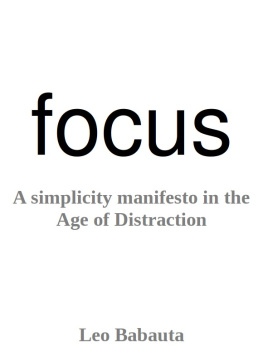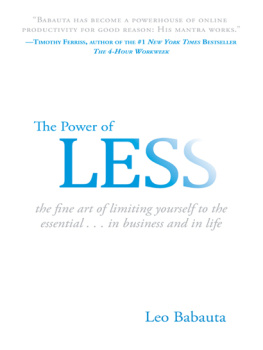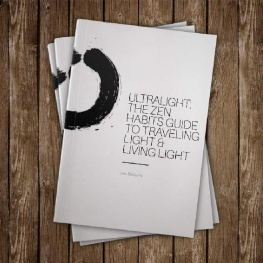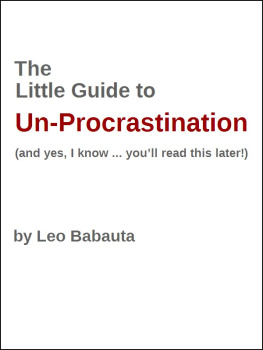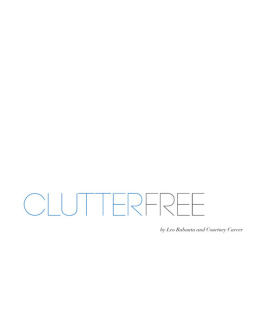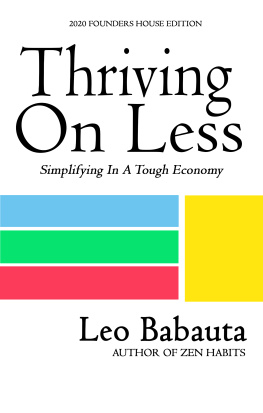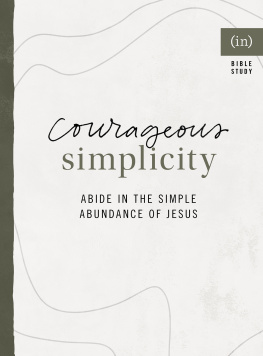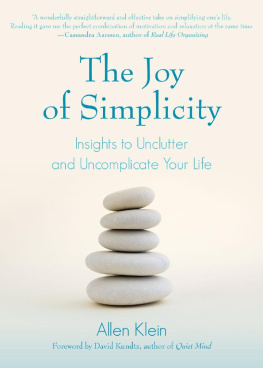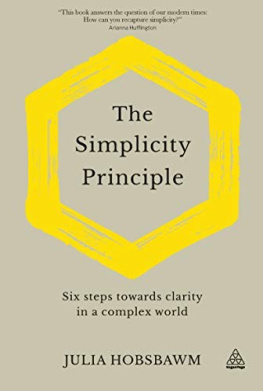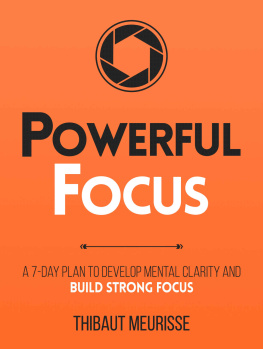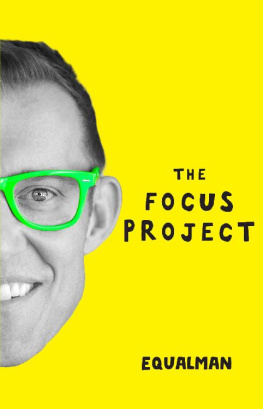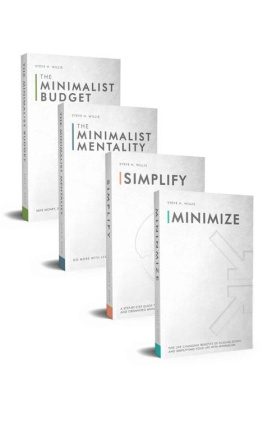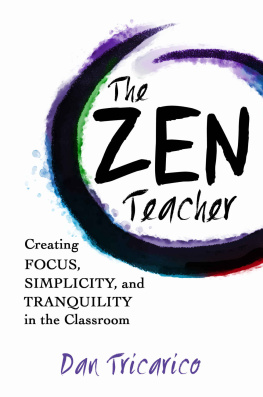
Table of Contents
Full Version
about focus
This book, "focus", is by Leo Babauta, creator of zen habits(http://zenhabits.net) and mnmlist (http://mnmlist.com). It was writtenpublicly, online, in small bursts, with feedback from readers throughout thewriting process. It would be much worse without their wonderful help.
dedication
The book is dedicated to my grandfather, Joe Murphy, who lived a life thatinspired me, and whose death has left a gap in my life... and to mygrandmother, Marianne Murphy, who I love deeply and whose strength and kindnesshave always pointed the way for me.
uncopyright
All content of this book are in the public domain. I hereby waive all claimof copyright in this work; it may be used or altered in any manner withoutattribution or notice to the me. Attribution, of course, is appreciated.
To clarify, I'm granting full permission to use any content on this site,including the chapters of my book, in any way you like. I release my copyrighton this content.
While you are under no obligation to do so, I would appreciate it if yougive me credit for any work of mine that you use, and ideally, link back to theoriginal. If you feel like spreading a copy of this book, you may do so withoutpayment.
section i:
step back
1: introduction
"Smile, breathe and go slowly."
- Thich Nhat Hanh
This won't be a long book, a detailed treatise into modern life with anexhaustive system of remedies.
It's meant to be short, simple, concise. We'll talk about some of theproblems we face as we try to live and create in a world of overwhelmingdistractions. And we'll look at some simple ways to solve those problems.
And yet, at the heart of this simple book lies the key to many of thestruggles we face these days, from being productive and achieving our goals, togetting healthy and fit in the face of fast food and inactivity, to findingsimplicity and peace amidst chaos and confusion.
That key is itself simple: focus.
Our ability to focus will allow us to create in ways that perhaps we haven'tin years. It'll allow us to slow down and find peace of mind. It'll allow us tosimplify and focus on less -- on the essential things, the things that mattermost.
And in doing so, we'll learn to focus on smaller things. This will transformour relationship with the world. It's not that "less is more", but "less isbetter". Focusing on smaller things will make us more effective. It'll allow usto do less, and in doing so, have more free time for what's important to us.It'll force us to choose, and in doing so, stop the excesses that have led toour economic problems, individually and as a society.
Focus. Smaller things. Less. Simplicity. These are the concepts that we'lltalk about, and that will lead to good things in all parts of our lives.
my story
If you don't know me, I'm Leo Babauta, best known for my popular blog onsimplicity, Zen Habits (http://zenhabits.net), and my best-selling productivitybook, The Power of Less (http://thepowerofless.com).
These concepts of simplicity and focus and less... they've been a revelationto me, in my life. In the past few years, I've completely changed my life bychanging one thing at a time, by learning to find focus so that I can create,by simplifying and focusing on less.
I thought I'd share this because it's an illustration of how effective theseideas are -- and they've worked not only for me but for many of my readers.
By focusing on one thing at a time, small changes, little baby steps, I'vebeen able to change a bunch of habits: I quit smoking, started running, beganeating healthier, started waking earlier, and became more organized. And I'veaccomplished a lot more, taking on one project at a time and using the power offocus and the power of play to accomplish things: running a few marathons andtriathlons, simplifying my life, eliminating my debt, starting up a successfulblog and business, writing a few books, and much more.
This stuff works. And it's tremendously liberating to discover that you canfind focus, you can simplify, and you can change your life.
2: the age of distraction
"Our life is frittered away by detail... simplify, simplify."
- Henry David Thoreau
We live in curious times. It's called the Age of Information, but in anotherlight it can be called the Age of Distraction.
While humanity has never been free of distraction -- from swatting thosebothersome gnats around the fireplace to dealing with piles of paper mail andringing telephones -- never have the distractions been so voluminous, sooverwhelming, so intense, so persistent as they are now. Ringing phones are onething, but email notifications, Twitter and Facebook messages, an array ofbrowser tabs open, and mobile devices that are always on and always beeping arequite another. More and more, we are connected, we are up to our necks in thestream of information, we are in the crossfire of the battle for our attention,and we are engaged in a harrying blur of multitasking activity.
When we're working, we have distractions coming from every direction. Infront of us is the computer, with email notifications and other notificationsof all kinds. Then there's the addicting lure of the browser, which containsnot only an endless amount of reading material that can be a black hole intowhich we never escape, but unlimited opportunities for shopping, for chattingwith other people, for gossip and news and lurid photos and so much more. Allthe while, several new emails have come in, waiting for a quick response.Several programs are open at once, each of them with tasks to complete. Severalpeople would like to chat, dividing our attention even further.
And that's just in front of us. From the sides come a ringing desk phone, aringing mobile device, music from several different coworkers, a colleaguecoming to our desk asking a question, incoming papers needing attention, otherpapers scattered across our desks, someone calling a meeting, another offeringup food.
With so much competing for our attention, and so little time to focus onreal work, it's a wonder we get anything done at all.
And then we leave work, but the attack on our attention doesn't end. Webring the mobile device, with incoming text and email messages, all needing areply, with incoming calls that can't be ignored. We have reading material,either in paper form or on the mobile device, to keep our attention occupied.We are bombarded from all sides by advertising, asking for not only attentionbut our desires. We get home, and there's the television, constantly blaring,with 500 channels all asking for yet more attention, with 500,000 ads askingfor yet more desires. There's our home computer, asking us to do more work,sending us more messages, more distractions, social networks and shopping andreading. There are kids or spouses or roommates or friends, there's the homephone, and still the mobile device is going off.
This is unprecedented, and it's alarming.
We've come into this Age without being aware that it was happening, orrealizing its consequences. Sure, we knew that the Internet was proliferating,and we were excited about that. We knew that mobile devices were becoming moreand more ubiquitous, and maybe some people harrumphed and others welcomed theconnectivity. But while the opportunities offered by this online world are agood thing, the constant distractions, the increasingly urgent pull on ourattention, the stress of multitasking at an ever-finer granular level, theerosion of our free time and our ability to live with a modicum of peace...perhaps we didn't realize how much this would change our lives.
Next page
